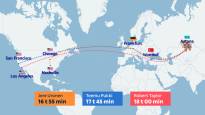Huhkaji’s MLS players traveled through 13 time zones for the away match against Kazakhstan. The difficult route causes extraordinary challenges for preparation.
Finland will meet Kazakhstan in the European Championship qualifying match on Thursday at 17:00. The live broadcast of the match starts on TV2 and Areena at 16:30.
It’s a long way to Astana, the capital of Kazakhstan.
Especially from North America. Three MLS players from Huhkaji, Teemu Pukin, by Robert Taylor and Jere Uronen the preparation possibilities for Thursday’s important EC qualifying match are far from ideal.
Pukki and Uronen were still playing in their club teams on Sunday morning Finnish time. Taylor was with Inter Miami in Los Angeles on Monday morning Finnish time, but sat on the bench for the entire match.
The time difference, for example, from Los Angeles to Astana is as much as 13 hours. So 13 time zones are crossed during the flight. It is almost the most extreme flight on Earth. During flights, day changes to night and night to day.
Teemu Pukki
San Francisco -> Frankfurt 11h
Frankfurt -> Astana 6h 45 min
Total time in the air 17h 45min
Robert Taylor
Los Angeles -> Istanbul 13h
Istanbul -> Astana 5h
Time in the air a total of 18 hours
Jere Uronen
Nashville -> Chicago 1h 45min
Chicago -> Frankfurt 8h 25min
Frankfurt -> Astana 6h 45min
Total time in the air 16h 55min
Pukki and Uronen will arrive on Monday, Taylor on Tuesday.
Source: Balloliitto
Physiologist at KIHU, the institute for elite sports Esa Hynynen has built Finnish athletes’ time difference guidelines for the Olympics. When preparing for the Olympic Games, you usually don’t have to worry about the rest of the competition program, but all preparation is aimed at specific games.
If the intention is to travel from Los Angeles to Astana to play, in the ideal situation, according to Hynynen, you would be there at least a week before the match. In football, this is not possible – for example, Taylor has only arrived at the venue on Tuesday, two days before the match.
The rule of thumb for the days needed for the body to adapt is to divide the time difference by two. Flying east is a heavier direction in terms of the time difference burden.
– When you come to a new reality after such a drastic time difference, the first few days should be taken easy anyway. You shouldn’t expect anything technically challenging or extreme performances, but take it in moderation, says Hynynen.
The flight times of the players are wild. Still, they are the best possible. This is Huuhkajie’s physical trainer Joni Ruuskanen considers the most important thing.
– In general, MLS clubs and players are travel professionals. There is a lot of traveling there, so the players are really awake, says Ruuskanen.
The national match windows are mostly entered directly from the weekend club team games, in which case the load of the players is taken into account in the training of the first days of the camps. Waking up times are also set in Huuhkaj to be flexible depending on the situation. According to Ruuskanen, players are not forced to wake up at a certain time, but breakfast is offered with a few hours of flexibility.
– An important metric for us is what the players themselves say. What is your readiness to exercise, how well have you slept and what is your general state of alertness? Based on the discussion, we will see if there is a need to modify the training, says Ruuskanen.
From the Finns, Pukki played 80 minutes and Uronen 82 minutes at the weekend. Taylor sat on the bench for the entire game. Physical recovery can be done well before the flight, but the fatigue brought by the time difference is a tougher challenge.
– It causes a big challenge for the psyche. The ability to concentrate and mood fluctuate more easily and stress rises, says Hynynen.
Professor of fur at the Department of Health and Welfare Timo Partonen specializes in the effects of sleep and circadian rhythm in humans.
– It is to be expected that on such a long flight, the ability to concentrate will deteriorate and not be as good as it could be. The attention span is narrower. In a team game, observation can be more difficult. Cognitive functions can be a bit slow due to the stress of the time difference, which makes injuries more prone to occur, Partonen states.
– The mood can become more irritable, which can be unpleasant in terms of team spirit. In that case, it is important to create as relaxed an atmosphere as possible and to overemphasize the impact of time difference stress.
Huuhkajat won the previous match played in Kazakhstan almost two years ago. Now the top two teams in the group are facing each other with equal points. The previous team that visited Astana was Denmark, who lost a two-goal lead and lost 2–3.
– Home benefit, home support, artificial grass and time differences. Everything is on their side, but everyone has to come here. It’s life, let’s enjoy it! It’s good to have a bit of a challenge. It makes everything a little more interesting, defender Robert Ivanov said to Urheilu in Astana.
